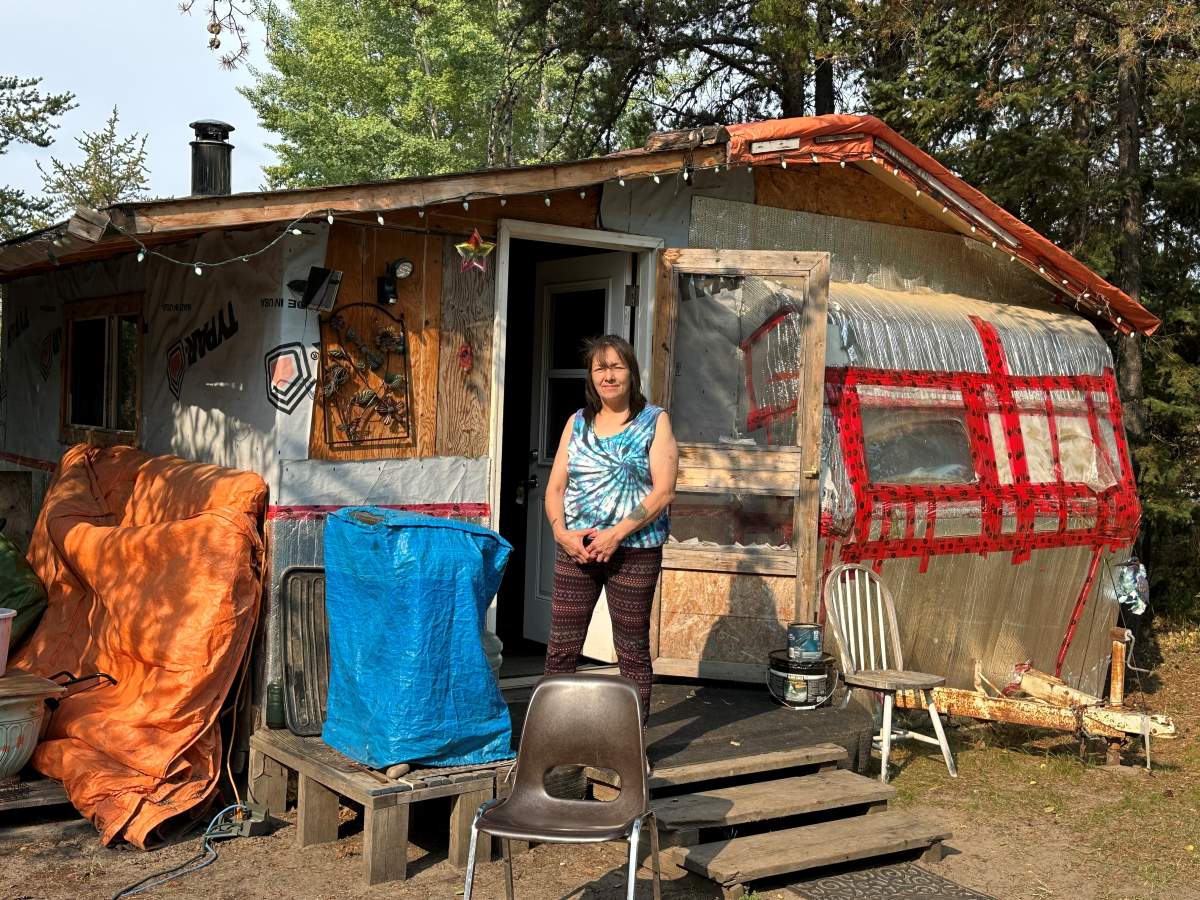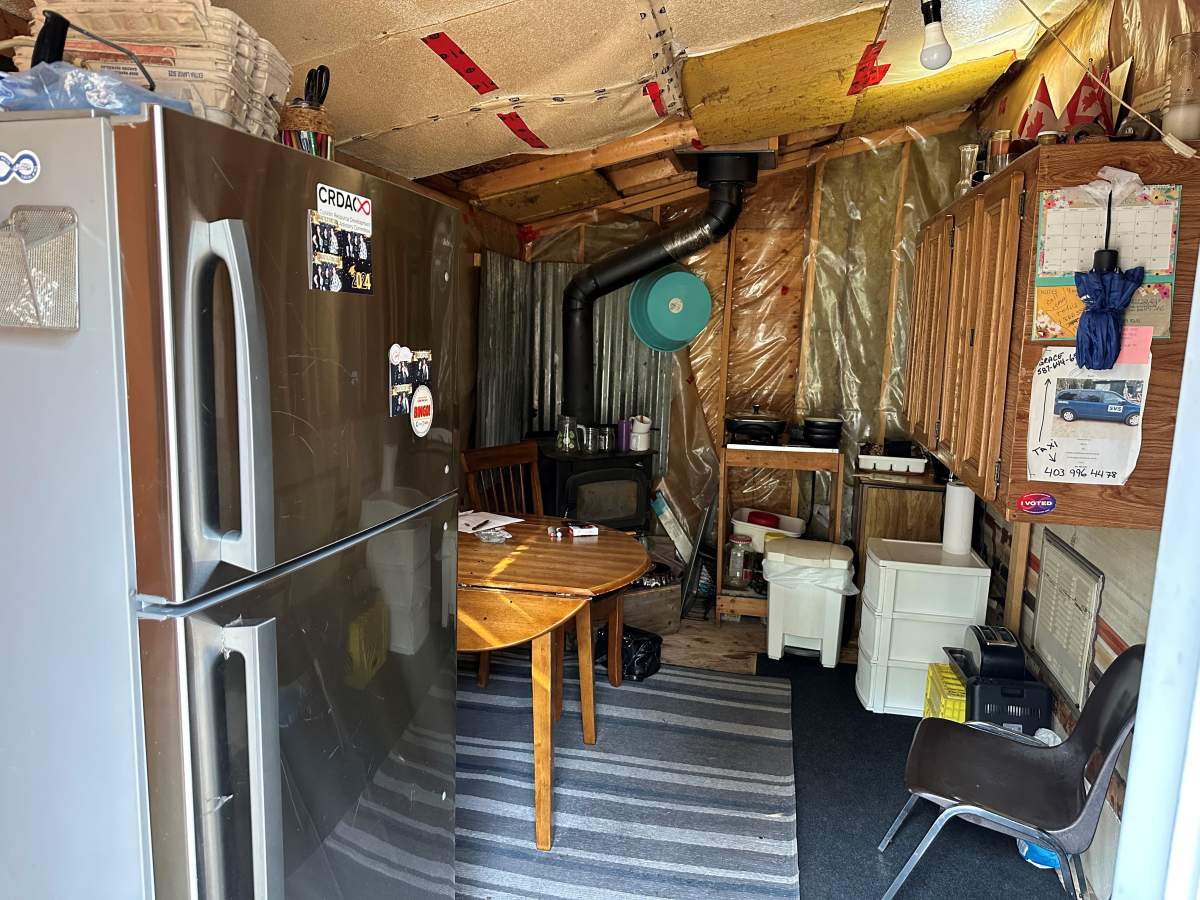The hamlet of Conklin has one gas station, a school and a community center.

The community along Highway 881 in northeastern Alberta sits beside the shores of Christina Lake, where residents pull pike and walleye from its waters.
It has deep Metis roots and despite the lack of amenities, there’s nowhere else many of its close to 200 residents want to be.
“This is family, this is home,” said Grace Richards, who grew up in the community, on the same land her mother was born.
“There’s a lot of good memories,” she said, pointing to her grandmother’s old log cabin. Its roof now sits in a grassy meadow.
After living 150 kilometres north in Fort McMurray for work and education, Richards moved back to Conklin eight years ago — but finding an adequate roof to put over her head has been trying.
There’s nothing for rent and it’s too expensive to build in the remote region where there are more workers living at nearby oil and gas operations than permanent residents.
Richards has been living in a small converted camper with a wooden extension, no more than 200-square-feet in size.
“It’s the longest camping trip I’ve ever been on,” she laughs.
“That’s my dryer over there,” she said, pointing at her clothing line. Richards doesn’t have running water or plumbing and cooks on a hot plate.
“It’s very, very cold in the winter,” she said, adding when it drops below -25 C she will stay at her mom’s house.
Her sister Darlene lives on the other side of the property in a similar set up.
“If you are wondering what all the Bounce (dryer) sheets are for, it’s to keep the spiders away,” she laughs while giving Global News a tour of the place she’s called home since 2016.

Get breaking National news
So what do they do when nature calls?
“This is for night time, especially in the winter,” she said, standing in front of a portable free-standing toilet seat. “I put a bucket under there and take it out every morning.”
Darlene said while it’s cozy, she keeps her space tidy and organized and everything serves a purpose. Her adult daughter also lives with her.
“Yup, we share the bed,” she laughs.
For electricity, she said she has an extension cord coming from her mom’s house and pays the power bill as rent.
“I would say the hardest part is hauling the wood in the winter. I have to work to get whatever I want here, it’s a lot of work,” Darlene admits.
“But really, it’s all I’ve known.”
The community has been hit hard by the housing crisis. People are living in overcrowded homes in need of repair, some are couchsurfing, according to Val Quintal, who is part of the Conklin Housing Initiative.
“A study from 2021 found 92 adults are in need of a home,” Quintal said. “As a result, we need about 40 new houses.”

It’s an issue an Alberta energy company that operates in the Christina Lake area said it couldn’t ignore.
Cenovus is spending $50 million to build 200 homes in six Indigenous communities near its oilsands operation sites in northern Alberta, including 21 in Conklin.
“Part of being a good neighbour is when those needs arise (we) do something about it. So this is a collaborative effort between Cenovus and the communities,” said Dustin Meek, manager of Indigenous business development and housing at Cenovus.
“We are working with Indigenous Services Canada to help with the infrastructure and lot development but the funding for the homes comes strictly from Cenovus,” said Meek.
“The maintenance of these homes is something discussed with the communities, that will reside with the responsibility of the communities.”
Both Richards sisters have qualified for homes. Selection is based on a points system that ranks need and current quality of life.
On Monday, the sisters got to see inside some of the new prefabricated homes for the first time.
“Oh my goodness!” Grace exclaimed, clasping her hands to her cheeks, “It’s actually happening, I can’t believe this — it feels so good!” she said with tears in her eyes.
The homes with bright kitchens and two bathrooms have power, plumbing and running water. Grace said she can’t wait to have her first bubble bath in years.
“There’s so much that it does mean, I can’t express right now. I still get choked up thinking about it,” she said.
“Dignity is one.”
The first phase of residents will move in before the end of the year.










Comments
Want to discuss? Please read our Commenting Policy first.